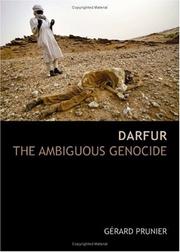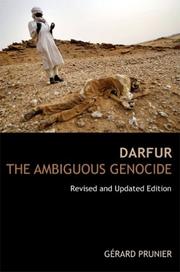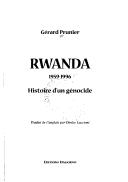| Listing 1 - 10 of 25 | << page >> |
Sort by
|
Book
ISBN: 1850652473 1850652430 Year: 1995 Publisher: London : Hurst,
Abstract | Keywords | Export | Availability | Bookmark
 Loading...
Loading...Choose an application
- Reference Manager
- EndNote
- RefWorks (Direct export to RefWorks)
History of Africa --- National movements --- anno 1900-1999 --- Rwanda --- 967.598 --- 323.27 <675.98> --- 355.426 <675.98> --- #SBIB:327.5H21 --- #SBIB:328H419 --- #SBIB:39A73 --- Vrede – oorlog, oorlogssituaties --- Instellingen en beleid: andere Afrikaanse landen --- Etnografie: Afrika --- Genocide --- Génocide --- History --- Histoire --- Civil war, 1994 --- Rwanda - History - Civil War, 1994.
Book
ISBN: 9781850656654 9781850655237 9781850659587 1850656657 Year: 2009 Publisher: London : Hurst & Co.,
Abstract | Keywords | Export | Availability | Bookmark
 Loading...
Loading...Choose an application
- Reference Manager
- EndNote
- RefWorks (Direct export to RefWorks)
Following the 1994 genocide in Rwanda, the largely Tutsi RPF government built a repressive regime after a short pretence at national reconciliation, while hundreds of thousands of Hutu, many of whom had perpetrated the genocide, fled to Zaire. The two parties clashed when the Rwandan government attacked the refugee camps in September 1996, forcing some of the refugees back home and killing others. Their military success led the victorious Rwandan forces to push their advantage and overthrow President Mobutu with the help of several African allies and the discreet support of the United States. The collapse of the Zairian regime marked the passing of an era and the implosion of the Cold War postcolonial order in Africa. As a result the heart of the African continent has been engulfed in a low intensity but high civilian casualty conflict involving seven countries directly and another seven indirectly. The international community has shown little interest, yet this massive conflict will probably play a key role in reshaping the continent's future in terms of border definition, governance and economic change, all of which are addressed in this work.
Great Lakes Region [Africa] --- Génocide --- Violence politique --- Géopolitique --- Congo (République démocratique) --- Refugees. --- Réfugiés --- Armed conflict. --- War. --- Génocide --- Géopolitique --- Congo (République démocratique) --- Internal politics --- International relations. Foreign policy --- Polemology --- anno 2000-2009 --- anno 1990-1999 --- Congo --- Genocide --- Geopolitics --- Political violence --- Congo (Democratic Republic) --- Rwanda --- Africa, Central --- Afrique centrale --- History --- Ethnic relations --- Political aspects --- Histoire --- Réfugiés --- Relations interethniques --- Aspect politique

ISBN: 0801444500 0801461944 0801462002 Year: 2008 Publisher: Ithaca, NY : Cornell University Press,
Abstract | Keywords | Export | Availability | Bookmark
 Loading...
Loading...Choose an application
- Reference Manager
- EndNote
- RefWorks (Direct export to RefWorks)
Praise for the 2005 Edition: "A passionate and highly readable account of the current tragedy that combines intimate knowledge of the region's history, politics, and sociology with a telling cynicism about the polite but ineffectual diplomatic efforts to end it. It is the best account available of the Darfur crisis."-Foreign Affairs "Does the conflict in Darfur, however bloody, qualify as genocide? Or does the application of the word 'genocide' to Darfur make it harder to understand this conflict in its awful peculiarity? Is it possible that applying a generic label to Darfurian violence makes the task of stopping it harder? Or is questioning the label simply insensitive, implying that whatever has happened in Darfur isn't horrible enough to justify a claim on the world's conscience, and thus invite inaction or even the dismissal of Darfur altogether? These questions lie at the heart of a much-needed new book by Gerard Prunier. In this book, Prunier casts aside labels and lays bare the anatomy of the Darfur crisis, drawing on a mixture of history and journalism to produce the most important book of the year on any African subject."-Salon.com "The emergency in Darfur in western Sudan is far from over, as Gérard Prunier points out in this comprehensive and authoritative book.... He concisely covers the history, the conflicts, and the players.... This book is essential for anyone wanting to learn about this complex conflict."-Library Journal "If Darfuris are Muslim, what is their quarrel with the Islamic government in Khartoum? If they and the janjaweed-'evil horsemen'-driving them from their homes are both black, how can it be Arab versus African? If the Sudanese government is making peace with the south, why would it be risking that by waging war in the west? Above all, is it genocide? Gérard Prunier has the answers. An ethnographer and renowned Africa analyst, he turns on the evasions of Khartoum the uncompromising eye that dissected Hutu power excuses for the Rwanda genocide a decade ago."-The Guardian Darfur: A 21st Century Genocide explains what lies behind the conflict in Western Sudan, how it came about, why it is should not be oversimplified, and why it is so relevant to the future of Africa. As the world watches, governments decide if, when, and how to intervene, and international organizations struggle to distribute aid, Gérard Prunier's book provide crucial assistance. The third edition features a new chapter covering events through mid-2008.
Genocide --- Sudan --- Darfur (Sudan) --- History --- History. --- Darfur Genocide, Sudan, 2003 --- -Sudan --- Dār Fūr (Sudan) --- دارفور --- دارفور (السودان) --- Darfour (Sudan)

ISBN: 0801446023 9780801446023 Year: 2007 Publisher: Ithaca (N.Y.) : Cornell university press,
Abstract | Keywords | Export | Availability | Bookmark
 Loading...
Loading...Choose an application
- Reference Manager
- EndNote
- RefWorks (Direct export to RefWorks)
Book
ISBN: 9780801462009 Year: 2011 Publisher: Ithaca, NY
Abstract | Keywords | Export | Availability | Bookmark
 Loading...
Loading...Choose an application
- Reference Manager
- EndNote
- RefWorks (Direct export to RefWorks)
Book
ISBN: 2865374718 9782865374717 Year: 1994 Volume: *7 Publisher: Paris Nairobi Karthala IFRA
Abstract | Keywords | Export | Availability | Bookmark
 Loading...
Loading...Choose an application
- Reference Manager
- EndNote
- RefWorks (Direct export to RefWorks)
Political systems --- Internal politics --- History of Africa --- Uganda --- Ouganda --- Politics and government --- History --- Religion --- Economic conditions --- Politique et gouvernement --- Histoire --- Conditions économiques --- Conditions économiques --- Religion.

ISBN: 2910019381 9782910019389 Year: 1997 Publisher: s. l. Dagorno
Abstract | Keywords | Export | Availability | Bookmark
 Loading...
Loading...Choose an application
- Reference Manager
- EndNote
- RefWorks (Direct export to RefWorks)
Genocide --- Génocide --- Rwanda --- Politics and government --- Politique et gouvernement --- 967.598 --- #SBIB:328H419 --- #SBIB:96G --- #SBIB:AANKOOP --- Geschiedenis van Rwanda. Ruanda --- Instellingen en beleid: andere Afrikaanse landen --- Geschiedenis van Afrika --- 967.598 Geschiedenis van Rwanda. Ruanda --- Génocide --- History --- Civil war, 1994 --- Causes --- 20th century --- Ethnic relations --- Political aspects --- Hutu (African people) --- Tutsi (African people) --- Genocide - Rwanda --- Histoire --- Politique --- Afrique centrale
Book
ISBN: 9782072955952 Year: 2021 Publisher: Paris : Gallimard,
Abstract | Keywords | Export | Availability | Bookmark
 Loading...
Loading...Choose an application
- Reference Manager
- EndNote
- RefWorks (Direct export to RefWorks)
Book
ISBN: 2707127701 Year: 1997 Publisher: Paris La Découverte
Abstract | Keywords | Export | Availability | Bookmark
 Loading...
Loading...Choose an application
- Reference Manager
- EndNote
- RefWorks (Direct export to RefWorks)
International relations. Foreign policy --- Polemology --- Great Lakes Region [Africa]
Book
ISBN: 282187233X 9994480898 Year: 2017 Publisher: Addis Abeba : Centre français des études éthiopiennes,
Abstract | Keywords | Export | Availability | Bookmark
 Loading...
Loading...Choose an application
- Reference Manager
- EndNote
- RefWorks (Direct export to RefWorks)
À partir de l’étude des sources européennes et des traditions orales ‘afar, cet ouvrage propose une synthèse impressionnante et unique en son genre sur l’histoire politique du territoire d’Awsa pris en étau entre les implantations des puissances européennes sur les côtes de la mer Rouge et la construction de l’État moderne d’Éthiopie. À travers cette histoire très complexe faite d’alliances, de rivalités, de renversements, de conflits et d’arrangements, on observe la façon dont les ‘Afar et leurs dirigeants ont été des acteurs déterminants de l’évolution politique et économique de l’Éthiopie telle qu’on la connaît aujourd’hui. C’est ce que révèlent les paroles du sultan ‘Ali-Miraḥ qui constituent la deuxième partie de l’ouvrage. L’auteur a accompli le tour de force de recueillir une série d’entretiens à travers lesquels le sultan se souvient de sa longue existence, des personnalités historiques qu’il a côtoyées, des positions qu’il a dû prendre pour son peuple, pour protéger son autonomie, pour tenter de lui apporter un développement économique partagé avec les autres Éthiopiens. La disparition du sultan ‘Ali-Miraḥ en avril 2011 a suscité l’expression de nombreux témoignages sur l’intelligence politique du sultan et le rôle de conciliateur qu’il a joué pour préserver l’unité de la nation éthiopienne tout en reconnaissant la diversité et l’autonomie des peuples qui la compose. Ces témoignages viennent aussi bien d’anciens dignitaires du régime impérial, que de ceux qui l’ont combattu du côté érythréen ou du côté de nationalités éthiopiennes. Parmi les témoignages inédits qui sont ici publiés, soulignons l’intérêt tout particulier que revêt le long entretien de Ḥanfaré ‘Ali-Miraḥ, recueilli avant qu’il ne soit désigné comme le successeur de son père à la charge de sultan, pour laquelle il sera investi en novembre 2010. Cet entretien, portant sur l’époque impériale, montre le rôle essentiel qu’il a joué au côté de son père notamment au sein des divers groupes…
Afar (African people) --- History --- Afara (African tribe) --- Danakil (African people) --- Cushites --- Ethnology --- ethno-history --- history
| Listing 1 - 10 of 25 | << page >> |
Sort by
|

 Search
Search Feedback
Feedback About UniCat
About UniCat  Help
Help News
News